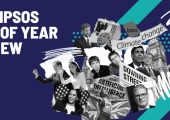Lord Hodgson Charities Act Review
General public research conducted by Ipsos's charities team to feed into the Lord Hodgson Charities Act Review
Ipsos recently conducted a research study amongst the general public in England and Wales to feed into the Review of the Charities Act 2006 conducted by Lord Hodgson.
Broadly, there were two underlying aims of the Review:
1) To report on the operation and effectiveness of the provisions of the 2006 Act;
2) To consider whether further changes could be made to improve the legal and regulatory framework for charities.
The Review's work was framed by four underlying principles: the need to maintain public trust and confidence in charities; the need to maintain the independence and diversity of the sector; the need to ensure the sustainability and resilience of the sector; and the need to facilitate innovation and growth in the sector.
Key findings from the Ipsos general public research
Members of the public were asked about the ways in which they had been asked to give to charity, and the ways in which they prefer to give to charity.
- Most have been asked to put money in a collection tin (86%) and also prefer to give this way (79%)
- Sponsoring someone is also a common way to be asked (75%) and a popular way to give (77%)
- Three fifths have been asked to donate via an ongoing direct debit (58%) but fewer prefer to give this way (41%)
- A third have been asked to give money to a door-to-door collector (34%) but only 17% prefer to give this way
- Similarly, a third have been asked to sign up to a direct debit off the street (34%) but few prefer to give this way (6%)
- Seven out of ten British adults believe that more should be done to regulate the fundraising activities of charities, but very few have heard of the Fundraising Standard Board (FRSB) which fulfils the role (Nine in ten have not heard of the FRSB (90%)
- When given information about what the FRSB does, the public are split in their views on whether the scheme should be compulsory or voluntary, with 50% saying compulsory, 43% voluntary and 7% undecided
The role of trustees
- Two percent of the sample said they were a trustee of a charity
- The main reason given for not being a trustee is lack of time (39%), while a quarter have never thought about it (25%)
- Those who are not currently trustees were asked if they thought trustees got paid; over a third think they are not paid (37%) while three in ten think they are (31%), and the rest do not know (32%)
- When given more information about the role of trustees, the majority of the public feel that trustees should not be paid other than expenses (61%)
- However, two thirds of people agree that paying trustees would encourage a wider range of people to consider signing up to be one (65%), while just one in five disagree (20%)
Download the survey topline (PDF)
Technical details
Ipsos interviewed a nationally representative sample of 1,004 adults in England and Wales 20-22 April 2012. Interviews were conducted by telephone, using Computer Assisted Telephone Interviewing (CATI) via our telephone omnibus service. The results have been weighted to the known population profile of adults in England and Wales.
More insights about Public Sector


